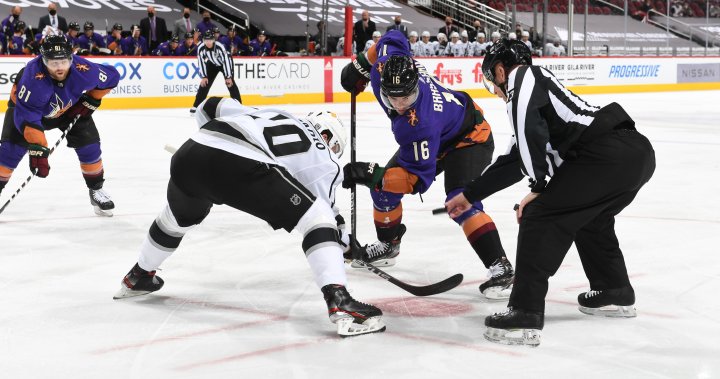Vaughan Rody has dropped a couple pucks in his day.
About half a million — give or take — by his estimate.
The former NHL linesman knows faceoffs. The fundamentals, the tricks, the tells, the cheats. He’s also lived the on-ice importance of consistency, communication and relationships.
There’s a lot that goes into the seemingly simple action of restarting a hockey game. And even though players have taken thousands of draws themselves, there are still befuddled expressions from time to time when a centre gets kicked out of the circle.
“We want fairness and structure,” said Rody, who retired in 2022 after more than two decades in the NHL.
“We need players to buy in. If they don’t, they need to be replaced. It’s like parenting. You almost have to force buy-in. I don’t mean that disrespectfully, but you have to replace them occasionally.
“Might be four or five times until they understand your standard.”
Linesman Vaughan Rody reacts after officiating his final game of a 22 year career during a game between the Seattle Kraken and Colorado Avalanche at Climate Pledge Arena on April 20, 2022 in Seattle, Washington.
Christopher Mast/NHLI via Getty Images
Figuring out where that standard sits, however, is an ongoing challenge. One official will allow something another might let slide. A skate or stick’s positioning could produce different outcomes depending on the game.
“That’s where some of the frustration lies,” Edmonton Oilers captain Connor McDavid said. “It can vary from night-to-night.”
Rody, a Winnipeg native based outside Seattle, said it’s an issue as old as the game.
“There’s 34 NHL linesmen and everyone’s different,” he said. “It’s not robotic. You try to keep it as tight as possible. But everybody has their own line.
The email you need for the day’s
top news stories from Canada and around the world.
“That’s where the art of being a great centre comes in.”

With puck possession such a crucial aspect, faceoffs are an integral art. But even the sport’s best are usually successful just over half the time.
Pittsburgh Penguins captain Sidney Crosby has taken and won by far the most faceoffs this season, with a 58.3 per cent win rate heading into his team’s final regular-season game Wednesday.
He said linesmen are largely consistent, but instances arise where trends could offer a slight edge in the dot.
“Little things you try to pick up,” he said.
“It’s up to you to find ways to win ’em.”
Rody, who carved out a niche working with young centres in the Winnipeg Jets’ organization this season, said officials used to drop the puck from their waist, but that changed to a uniform release zone several years ago.
Defending centres also now have to put their sticks down first — a rule aimed at creating more offence — which gives attacking players an advantage.
“Had to have a pause,” Rody said of the moment right before the puck left his hand. “You’re looking for the proper window to make it efficient and fair.”
Players will also bend the rules as much as possible.
“You have to cheat,” Buffalo Sabres centre Tage Thompson said. “Some linesmen are a little more lenient, others are a little more strict.
“They’re usually pretty good at giving an explanation.”

Rody said communication and respect helps both parties.
“It’s just human nature,” he said. “It’s easier to be a little more strict on people you might not have that relationship with. It’s like everyday life. The people you know, you probably treat a bit differently.
“You don’t play favourites, but let’s call a spade a spade.”
Vancouver Canucks centre Elias Lindholm said he tries to know as many linesman names as possible.
“Not trying to reveal all my tricks here,” he said with a smile. “But I’m trying to be nice.”
Canucks counterpart Teddy Blueger said keeping cool in the heat of the moment is crucial.
“Important to respect those guys,” he said. “Don’t want them to have it out for you.”
Colorado Avalanche centre Nathan MacKinnon said being polite in the faceoff circle hasn’t really helped his cause.
“They’ll be nice to you,” he said. “But they’ll still kick you out.”
Officials also keep each other honest, including during intermissions, if it feels like the level has slipped.
“We’re the third team,” Rody said. “We can tell if our faceoffs aren’t consistent — if one team’s getting an advantage. Our job is to uphold the game’s integrity. That starts with faceoffs. We police each other. There’s lots of things Joe Public doesn’t see. We need to be on the same page.

— With files from Daniel Rainbird in Montreal and Nick Wells in Vancouver
© 2024 The Canadian Press




